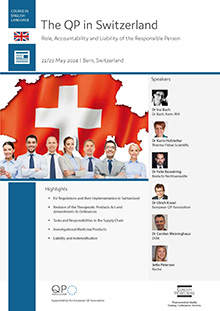New Code of Conduct developed for QPs
A new document was developed in 2022 by the Board of EQPA: “Ethics for the QP – A professional Code of Conduct”.
Background:
As described in Article 52 of EU-Directive 2001/83/EC Article 52, member states shall ensure fulfilling the QP duties, either by administrative measures or by making QPs subject to a professional code of conduct. As EQPA is not aware of a Code of Conduct being published by any EU/EEA authorities, it was decided to develop such Code until EU regulatory or National Competent Authorities (NCAs) will publish one.
It should provide guidance to EQPA-member QPs and may serve as a reference for specific ethical training for QPs and underpin decision making by the QP. The ethical duties of QPs are to ensure first and most important, that patients are protected, by ensuring finished products certified by the QP are meeting all relevant requirements. But also specifically, to emphasize that QPs have the professional duty to decline batch certification whenever they have an ethical concern.
Ethical and General Duties:
| The ethical duties identified and described in the Code include the following:
|
Please note, that there are many more details to further specify the individual ethical duties within the document itself.

Recommendation
Copenhagen, Denmark28/29 May 2024
Quality Oversight
General duties include also actions to be taken in case of any indication of fraud or negligent violation of rules by others. Therefore, it is recommended making sure that senior management is sufficiently aware of the QP's roles and responsibilities. This code is recommended for use. But not only Senior Management, the QP also needs to inform other groups of the specific roles and responsibilities of the QP.
Reinforcing knowledge by consulting other experts should be part of continuous development and education. The QP also needs to be satisfied with the Pharmaceutical Quality System.
Any Batch Certification without such adequate steps may be regarded as professional misconduct.
Professional and Ethical Conduct:
The QP does not only have duties to the employer, but of course most important to the patient as well as also to the national competent authorities. Whenever any aspect of the Pharmaceutical Quality System might be found not in accordance with ethical norms, the QP has the duty to bring this situation to the attention of senior management. Until corrections are effective, it might be necessary to refuse further batch certification by the QP.
Good working relationship also with Regulatory Inspectors are another very important element. In a situation, when undue pressure to depart from these standards cannot be counterbalanced, the QP has to consider contacting the appropriate authority, of course preferably having informed the employer first.
Disciplinary Procedures:
The QP has a personal responsibility. If risks to the patient have not been excluded a legal investigation against the QP may be initiated and certain disciplinary measures may be enforced.
This Code intends to become a reference to QPs and NCAs to assess professional and ethical conduct.

Recommendation
Munich, Germany4-6 June 2024
Qualified Person Education Course Module A PLUS IMP Pre-Course Session
Publication of the Code:
Version 1 of this Code is included as a new Chapter in the revision of the existing "EQPA Code of Practice for QPs" (version 10.0 as of March 2023), which is available in the member area of EPQA under the following link:
https://www.qp-association.eu/qpag_good_practice_guide.html
We hope this document will be found useful for many of the members of EQPA and look forward to learning about its use by both QPs and regulatory authorities as well.
About the Author
Wolfgang Schmitt
... is Vice President at CONCEPT HEIDELBERG and organises and conducts courses and conferences on behalf of the ECA Academy
in the areas QA and GMP. He is also Administration Manager of the European QP Association.



